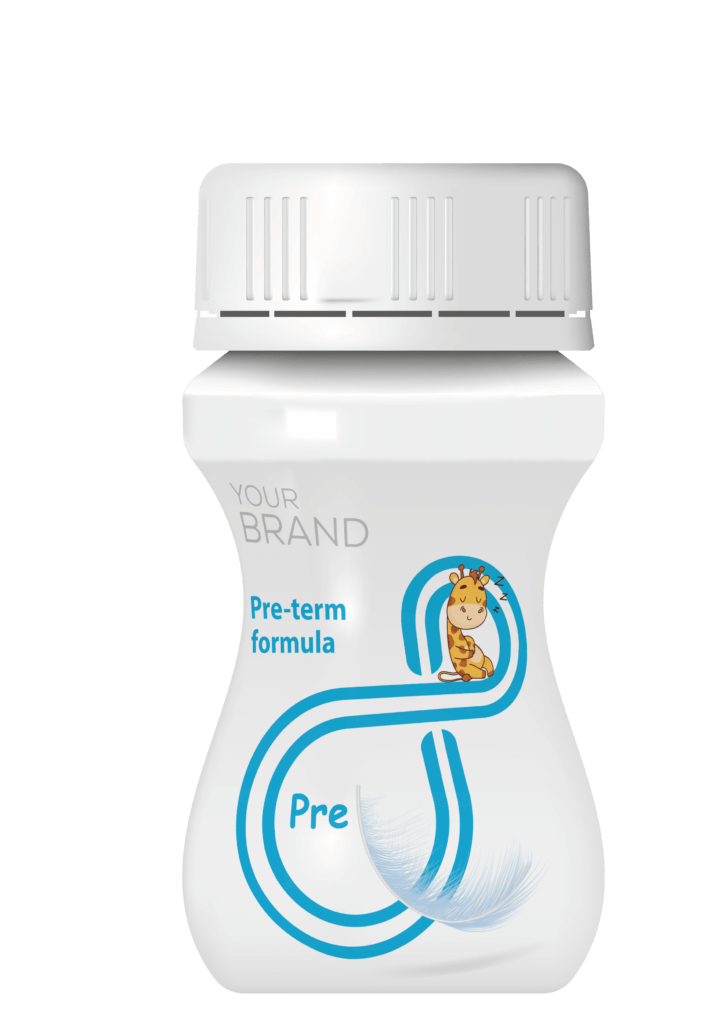Comfort, Preterm, AR, Lactose-Free: Everything You Need to Know About specialized infant formulas
In the complex world of specialized infant nutrition, navigating the available options can be challenging. Indeed, there are many specialized infant formulas, with a multitude of technical terms and highly specific nutritional needs that vary from one infant to another. Yet, proper development depends on receiving the right nutritional support.
That’s why Laïta Nutrition leverages its expertise to develop targeted, effective solutions. In this article, you’ll discover the key features of our AR, Comfort, Preterm, and Lactose-Free formulas—designed to support both families and healthcare professionals.
Specialized Infant Formulas AR: Effectively Reducing Regurgitation
Anti-Regurgitation (AR) formulas are designed to reduce gastroesophageal reflux (GER), a common cause of acid regurgitation, discomfort, and crying in infants. Around 25% of newborns are affected by GER [1]. Additionally, half of all babies under three months experience regurgitation, and this figure exceeds 66% by four months of age.
To address this issue, Laïta Nutrition enriches its AR formulas with locust bean gum, a natural fiber rich in high molecular weight polysaccharides. These indigestible compounds ferment in the intestine and exert a beneficial prebiotic effect [2]. As a result, these formulas support both digestive function and intestinal comfort.

To learn more about gastroesophageal reflux (GER) in infants, check out our full article here.
Specialized Infant Formulas Comfort: Promoting Better Digestive Well-Being

In infants, the digestive system is still immature. As a result, disorders such as colic are common. They affect approximately 20 to 25% of newborns in industrialized countries [3]. These digestive issues often lead to prolonged crying, irritability, and gas.
To help reduce these symptoms, our Comfort formula combines several functional ingredients:
- Nucleotides, which help strengthen the immune system [4]
- The BB12 probiotic strain, known for its digestive benefits [5]
- GOS (galacto-oligosaccharides), which support a healthy gut microbiota [6]
- A reduced lactose content, which helps limit fermentation and gas production
This formulation not only improves digestive tolerance, but also helps reduce intestinal discomfort in infants—contributing to better overall well-being.
Want to better understand colic in babies? Read our detailed article here.
Specialized Infant Formulas Preterm: Meeting the Specific Needs of Premature Babies
A baby is considered premature if born before 37 weeks of gestation. In France, this accounts for nearly 7% of all births [7]. Globally, one in ten babies is born prematurely, which represents approximately 13.4 million infants every year [8].
These infants have highly specific nutritional needs. Indeed, their organs—particularly the brain, lungs, digestive system, and immune system—are still developing.
To address this, our Preterm formula strictly follows ESPGHAN recommendations [9][10]. It provides:
- Increased levels of energy and protein
- Targeted enrichment with vitamins, including vitamin D
- Adjusted amounts of iron, choline, ARA, and DHA
Thanks to this approach, we provide a complete and tailored nutritional solution for these vulnerable infants.

Lactose-Free Specialized Infant Formulas: A Solution for the Most Sensitive Digestive Systems

Lactose is the primary sugar found in milk. It consists of glucose and galactose, and requires an enzyme called lactase to be properly digested.
However, some infants do not produce enough lactase. As a result, undigested lactose is fermented in the colon. This process generates gas, bloating, and sometimes diarrhea.
To prevent these issues, Laïta Nutrition offers Lactose-Free formulas, completely free of lactose. These products are ideal for babies with sensitive digestion while still ensuring a complete and balanced nutritional intake.
Conclusion: Expertise Dedicated to Your Projects
As you’ve seen, specialized infant formulas are designed to meet clearly defined nutritional needs. These products require not only a rigorous selection of ingredients, but also full compliance with regulatory standards.
At Laïta Nutrition, we put our expertise at the service of your innovations. That’s why we support you in developing custom-made products, available in powder or liquid format, and enriched according to your specific requirements. Furthermore, our ability to incorporate functional ingredients enables you to create distinctive solutions in a demanding market.
Are you a company in the nutrition sector? Contact us today to co-develop the specialized infant formulas that will perfectly meet the needs of your market.
https://www.linkedin.com/company/laita-nutrition
- Société Nationale Française de Gastro-Entérologie, Delaage PH, et al. Prévalence du reflux gastro-œsophagien (RGO). SNFGE. Disponible sur : https://www.snfge.org/content/prevalence-du-reflux-gastro-oesophagien-rgo-ch
- Tounian P, Meunier L, Speijers G, Oozeer R, Vandenplas Y. Effectiveness and Tolerance of a Locust Bean Gum-Thickened Formula: A Real-Life Study. Pediatr Gastroenterol Hepatol Nutr. 2020;23(6):511. DOI: 10.5223/pghn.2020.23.6.511
- Groupe Francophone d’Hépatologie Gastroentérologie et Nutrition Pédiatrique (GFHGNP). Coliques du nourrisson – Recommandations. 2018.
- Hess J, Greenberg NA. The Role of Nucleotides in the Immune and Gastrointestinal Systems. Nutr Clin Pract. 2012;27(2):281–94.
- Jungersen M, Wind A, Johansen E, Christensen JE, Stuer-Lauridsen B, Eskesen D. The Science behind the Probiotic Strain Bifidobacterium animalis subsp. lactis BB-12®. Microorganisms. 2014;2(1):92–110.
- Giovannini M, et al. Prebiotic Effect of an Infant Formula Supplemented with Galacto-oligosaccharides. Clin Nutr. 2014;33(5):865–71.
- INSERM (Institut National de la Santé et de la Recherche Médicale). La prématurité en France – Données épidémiologiques.
- World Health Organization. Preterm Birth: Key Facts. Disponible sur : https://www.who.int/news-room/fact-sheets/detail/preterm-birth
- Agostoni C, Buonocore G, Carnielli VP, et al. Enteral nutrient supply for preterm infants: commentary from the ESPGHAN Committee on Nutrition. J Pediatr Gastroenterol Nutr. 2010;50(1):85–91. DOI: 10.1097/MPG.0b013e3181adaee0
